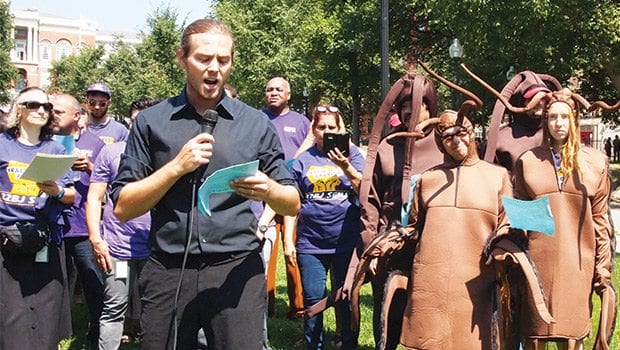
Members of the union representing MBTA janitors took to the Boston Common with song last week to protest pending layoffs. A few dozen janitors in purple SEIU T-shirts and several in full-body cockroach costumes gathered on the lawn by the Brewer’s Fountain Plaza where they performed a parody of “Charlie on the MBTA,” with string trio accompaniment. The lyrics criticize Governor Charlie Baker’s administration for the layoffs and predict grimy T stations to come.
They followed the demonstration with a Thursday sit-in outside Baker’s office and Sunday protest outside the State House, in time for the 40th annual New England Governors and Eastern Canadian Premiers.
According to Roxana Rivera, vice president of Service Employees International Union 32BJ, 25 percent of the 300-person janitorial workforce will lose jobs or hours. Seventy-six full-time positions will be eliminated, and about a dozen of these workers will be offered part-time jobs, Eugenio Villasante, the union’s communication strategist, told the Banner.
Over the past few years, MBTA payments to cleaning contractors ABM and S.J. Services rose by more than 50 percent over the amounts set in their 2013 agreements. Now, facing a $100 million deficit, the MBTA seeks to reduce costs, which the contractors say will mean a reduction in the workforce.
Janitorial layoffs are expected to save the MBTA $4.2 million, representing 4.2 percent of its anticipated deficit or two-hundredths of a percent of its overall $20.2 billion budget. Janitors are paid $18 per hour.
Precise dimensions of the layoffs are emerging, as some janitors received layoff and shift-reduction letters last week and others waited for information. The cleaning contractors signed new agreements with the MBTA in mid- and late August. Staffing changes are to be enacted September 1.
Letters sent to janitors from S.J. Services required recipients to respond within 48 hours on whether they would accept a change from daytime to nighttime shifts, which run 11 p.m. to 6:30 a.m. Those who declined would be added to the contractor’s rehire list, in order of seniority, the letters stated.
Rivera said this was too short notice for families to adjust, which may include finding childcare, and, for those moved to part-time, acquiring new health care.
The retained janitors are likely to see their workloads increase. Several received word that they would be expected to handle the cleaning for two additional T stations. Currently, keeping Haymarket Station and North Station clean between 8 a.m. and 10 p.m. is the responsibility of three janitors, Rivera said. S.J. Services informed her that under the changes, one person will now handle that work.
As part of workforce readjustments, S.J. Services intends to assign more workers to night shifts, when there are relatively fewer commuters. Company President David Shea said this will allow jobs to be performed more efficiently.
SEIU members have been critical about the practicality of these plans. Station bathrooms, elevators and stairs need frequent cleaning throughout the day, Rivera said. While upping nighttime staffing allows for more handling of major tasks, such as power washing, it does not reduce the regular maintenance needs of the daytime.
“The bathrooms need cleaning every ten minutes,” Rivera told the Banner. “They’re not saying they want to increase the power-washing crew.”
Rivera also charged that valuable time will be lost as janitors travel between an increased number of stations, delaying response to new messes, like spills or vomit.
While agreements between the MBTA and cleaning contractors already are signed, Rivera says there is precedent for non-enforcement — such as was done when the MBTA funded above the 2013 contract levels. Joe Pesaturo, MBTA spokesperson, stated to the Banner that the decision to pay above the contract requirements was made by the previous administration.
On Wednesday, August 24, Boston City Councilors voted to pass a resolution filed by Josh Zakim and Michelle Wu in support of the MBTA janitors. Wu and Zakim followed this with an op-ed in The Boston Globe on Tuesday. The councilors said the savings would be minimal and reduce cleanliness at a time when Boston expects an increase in commuters as its population grows.






